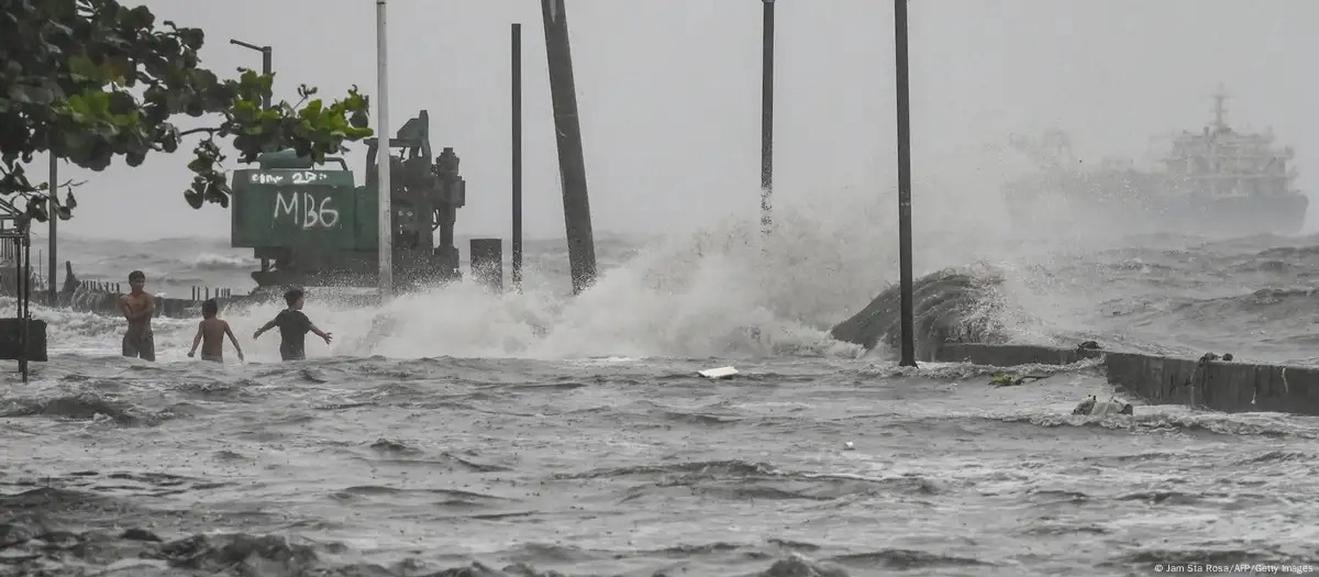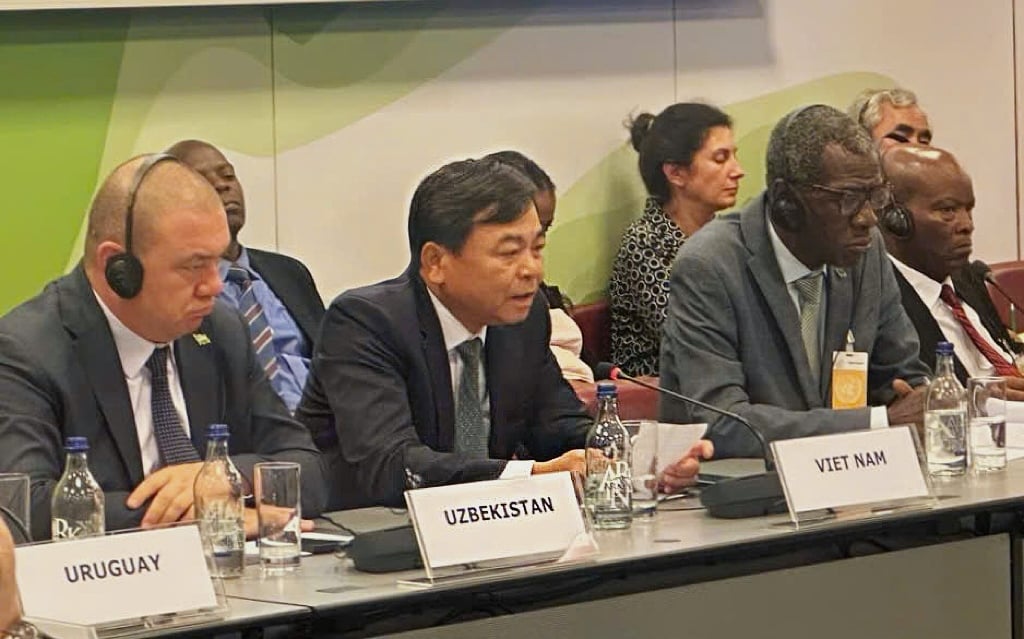December 6, 2025 | 15:37 GMT +7
December 6, 2025 | 15:37 GMT +7
Hotline: 0913.378.918
December 6, 2025 | 15:37 GMT +7
Hotline: 0913.378.918

Following the economic losses caused by Typhoon Yagi, distributing the financial burden and ensuring resources for post-disaster reconstruction has become an urgent priority. Illustrative image.
The 8th Global Platform for Disaster Risk Reduction (GP2025) will be held from June 2 to June 6, 2025, at the Geneva International Conference Centre (CICG) in Switzerland. The event is co-hosted by the United Nations Office for Disaster Risk Reduction (UNDRR) in coordination with the Government of Switzerland.
The theme of GP2025 is “Every Day Counts, Act for Resilience Today.” The forum aims to review the progress in implementing the recommendations from the Political Declaration adopted by the United Nations General Assembly in May 2023, while also providing practical guidance to accelerate the implementation of the Sendai Framework before its conclusion in 2030. GP2025 expands its participation to include member states, parliamentarians, local authorities, United Nations system organizations, intergovernmental organizations, major UN partner groups, and other stakeholder groups.
During the discussion session on “Scaling up disaster risk transfer financing to enhance resilience,” Deputy Minister of Agriculture and Environment Nguyen Hoang Hiep emphasized Vietnam’s proposal to develop a sustainable financial system for disaster preparedness and response. This approach is intended to align with the overarching goals of the Sendai Framework, ensuring that financial resources are more effectively mobilized to manage and reduce disaster risks.
Typhoon Yagi brought about devastating impacts in Vietnam, resulting in 345 people reported dead or missing, the destruction of thousands of homes, and economic damages estimated at 0.7 percent of the country’s gross domestic product for the year 2024. In response to these losses, the Government of Vietnam has identified the establishment of a sustainable disaster risk financing mechanism as a key priority. This initiative aims to distribute the financial burden more equitably, stabilize the national economy, and create favorable conditions for recovery and reconstruction efforts in the aftermath of natural disasters.

Mr. Nguyen Hoang Hiep, Deputy Minister of Agriculture and Environment of Vietnam (center), attends the Global Platform for Disaster Risk Reduction. Photo: Department of Dyke Management and Flood Control.
Building on that foundation, the Vietnamese representative proposed enhancing investment in disaster-resilient infrastructure and improving the availability and quality of disaster risk data. These efforts aim to help identify appropriate financial solutions for regions that are particularly vulnerable to natural hazards. In addition, Vietnam emphasized the importance of strengthening international cooperation to mobilize investment resources for disaster prevention and response, while also sharing its own experiences and lessons learned to support other countries in improving their disaster preparedness and resilience.
Vietnam also reaffirmed its commitment to a comprehensive approach to disaster risk reduction, with the guiding principle of leaving no one behind. This includes prioritizing the allocation of investment resources to high-risk areas and ensuring that vulnerable communities have equitable access to financial support for disaster preparedness and response.
At the same time, Vietnam is integrating social protection programs and livelihood support initiatives into its disaster risk management strategies. These efforts aim to help vulnerable populations recover from disasters more effectively and build greater resilience in the future.
“This commitment is not merely a promise but a series of concrete actions that we are actively implementing on the ground. Vietnam is eager to work closely with governments around the world, learning from successful financial models for disaster risk transfer that have proven effective. Moreover, fostering collaboration with the private sector will be crucial in scaling up innovative initiatives, which in turn will deliver tangible benefits to communities most at risk.
Vietnam also calls on the United Nations to provide increased support to the most vulnerable countries in the Asia-Pacific region, enabling them to gain better access to multilateral and global funding mechanisms. These financial resources must be mobilized with a focus on enhancing the resilience of the communities that are most exposed to the escalating impacts of natural disasters and climate change,” Deputy Minister Nguyen Hoang Hiep emphasized.
The Global Platform for Disaster Risk Reduction provides an opportunity for Vietnam to affirm its proactive role in developing sustainable financial solutions to reduce disaster risk and protect people’s livelihoods. With a firm determination to act today, Vietnam continues to move towards a safer and more stable future in the face of ongoing disaster challenges.
Translated by Phuong Linh

(VAN) As of 2025, the ASEAN region has a total of 69 ASEAN Heritage Parks recognized across its 10 member states. Among them, Viet Nam contributes 15 ASEAN Heritage Parks.

(VAN) Yok Don National Park has high biodiversity with numerous endemic plant and animal species, and it is also the only dipterocarp forest ecosystem conservation area in Viet Nam.

(VAN) Viet Nam and Brunei signed two important MOUs on fisheries and IUU, expanding cooperation in agriculture, the environment, and Halal exports, aiming to substantively implement joint projects.

(VAN) The Viet Nam Coconut Association worked with the International Finance Corporation (IFC) and businesses to promote the supply chain, enhance competitiveness, and develop the coconut industry sustainably.
![Hue aims for Net Zero: [2] Pioneering low-emission tourism](https://t.ex-cdn.com/nongnghiepmoitruong.vn/608w/files/huytd/2025/12/04/0633-dulichzero-4-095634_236-161125.jpg)
(VAN) The ancient capital of Hue has developed Net Zero tourism products and models, aiming to reduce carbon emissions and pioneer the establishment of Viet Nam's green tourism destination.

(VAN) C.P. Viet Nam has announced the successful completion of its goal to plant 1.5 million trees during the 2021-2025 period, a key milestone within company's long-term ESG strategy and its roadmap for emission reduction.

(VAN) This is an initiative of MAE aimed at creating a unified coordination mechanism to implement agricultural cooperation programs with developing countries.